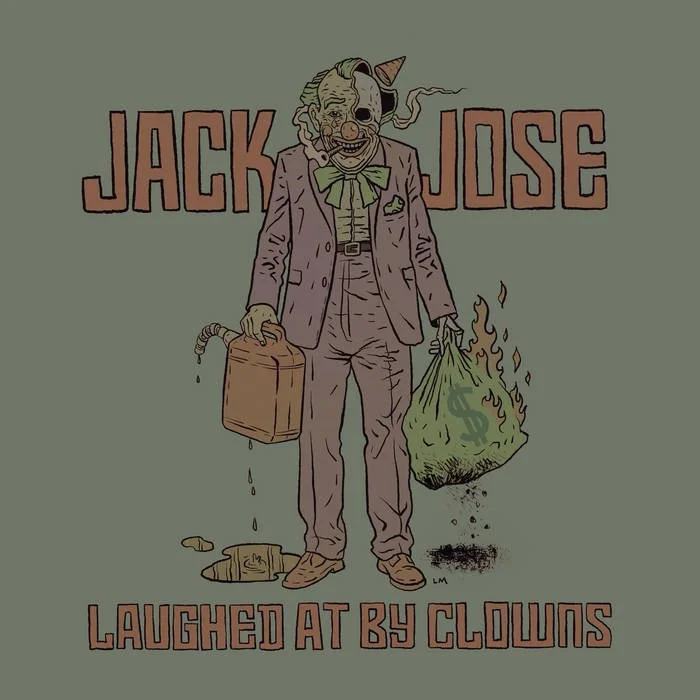


-
![Jack Jose - Laughed At By Clowns]()
Jack Jose - Laughed At By Clowns
alt rock, Americana, indie rock, pop rock, folk
Cincinatti songwriter Jack Jose released one of our favorite albums of the last couple of years, 2024’s phenomenal A Sunlit Place, and in the time since he has released a series of singles that continued building on his reputation for sharp lyricism and folksy charm. His latest album, Laughed At By Clowns, is currently available only on Bandcamp, and we strongly recommend it as part of your wishlist if you’re a fan of Americana, indie folk, late era Replacements / Paul Westerberg, MJ Lenderman, Todd Snider, and the like.
Jose has a killer lyrical sensibility and an earnest delivery that makes you feel like you’re catching up with an old friend. On this latest batch of songs, he’s expanded his musical palette substantially and delivered a raw, but beautifully arranged, document of a singular American artist.
-
![]()
Combover Beethoven - Somewhere In The Freefall
indietronica
Somewhere In the Freefall feels like the closing of a loop. Combover Beethoven have refined their approach to the point where it feels locked in. There’s a consistently forward vocal mix, allowing Unit’s delicate but emotionally profound delivery and his devastating texts to cut through.
On Freefall it feels like there’s a bigger role for louder and angrier guitars - though it’s still used tastefully and sparingly. But the effect is a wider and more powerful dynamic range. Witness the sprawling menace it lends to “Torn Away”, the way it provides a richer denouement for the glorious, gorgeous "Singlewide”, and the way that the infectious melancholy of “Breakfast In Bed” lifts off towards the end.
Thematically as well, this feels like a loop has closed. The closing track “Empire Falls” is inescapably reminiscent of the grabby obsession over borders, and who gets to cross them, that we explored on, well, Borders. Here, despite all the best efforts of all the worst people, the barbarians are, as predicted, through the gates - in fact, they were always here, waving the flag of the empire, calling themselves its defenders.
-
![]()
Dave Hawkins - Half Alive EP
indie, pop, rock, electronic
Denver, CO multi-instrumentalist and songwriter Dave Hawkins is a true original. He makes rich, thoughtful indie music that zig zags across genres, touching on Americana and indie pop and shoegaze and more. The thread tying it all together is his endearing voice, everpresent wit, conscious lyricism, and deft arrangements.
He’s out on Bandcamp (and in the process of releasing the rest one single at a time) with the best work of his catalog to date, the impressive Half Alive EP, offering a 5 song meditation on “finding presence in a world that keeps pulling you away”.
In the process of exploring that theme, Hawkins gives us some quirky and memorable performances, veering from sparkly pop rock to groovy psychedelic pop to plaintive ballad to electronic power pop to jazzy piano bar anthem. It’s a dizzying tour through Hawkins’ mind as well as his dazzling array of competences, and every track brings something utterly unique to the EP, to Hawkins’ catalog, and to the indie music landscape.
-
![]()
Kid Lightbulbs - Infinite Normal
industrial, experimental, rock
This isn’t easy music; even for those of us who’ve come to trust his artistic instincts, it often takes a few focused turns through a Kid Lightbulbs record before things really click.
Partly this is because the music is challenging, and the arrangements designed to convey maximum emotional clarity and punch rather than to keep you tapping your toes or muttering the hook.
But at least as often, it’s because he manages to be thought-provoking in real time in a way I don’t know anyone has matched for me. A Kid Lightbulbs song will often kick you off the edge of your concentration into a stream-of-consciousness spiral, like some sort of Internet-age Leonidas screaming “WE! ARE! PROCESSING SOME SHIT HERE!”
-
![]()
Western Jaguar - Kaleidoscope
power pop, alternative, indie rock
Jeffrey Trainor (British Columbia) makes shimmering, confident pop music under the moniker of Western Jaguar. We’ve been enjoying the drip of singles all year, and now the payoff has come in the form of Kaleidoscope, a tour de force of indie pop/rock that contains some of the finest songwriting, the most skillful playing, the most tasteful arranging, and the most immaculate vibes of anything we’ve covered in 2025.
This album packs a staggering number of great hooks and should-be hits into a tight package, with a couple of bonus tracks included in the Bandcamp version.
-
![Daring Coyotes / Tales From Mount Tom]()
Daring Coyotes - Tales From Mount Tom
Bluegrass, folk, traditional
This new album is decidedly more traditional and classic than the previous offering from David Clark Carroll (Daring Coyotes).
Where The Aftermath featured something like doom-grass instrumentals with deeply ominous undertones slathered in layer upon layer of sparkling strings, here we get arrangements that should feel more familiar to fans of mountain music. The album features deft performances from both Carroll and his collaborator Ryan Seiler (Broke String) on bass.
Taken as a whole, Tales From Mount Tom is a pretty big step forward in the Daring Coyotes catalog, a beautifully performed and produced, entirely cohesive, full-length collection that finds the project expressing confidence on all fronts.






